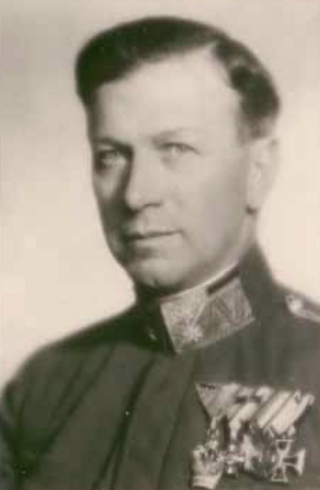Hofrat Generalmajor Matthias Johann Gruber

Personalia
Born:
Died:
Profession:
Persecution:
Discharge 15.03.1938,
Imprisonment 15.06.1938,
Imprisonment 09.11.1939 - 23.12.1939,
Imprisonment 12.09.1940 - 23.11.1944
Honors:
Order of the Iron Crown 3rd Class
Memberships
Curriculum Vitae
Matthias Johann Gruber was born in Vienna on June 24, 1886 as the legitimate son of the Ottakring master butcher of the same name, Matthias Gruber, and Anna Carolina Steger and joined the Imperial and Royal Army after graduating from the artillery cadet school in Traiskirchen.
In the First World War, he served as a captain in Field Artillery Regiment No. 133 and was awarded the Order of the Iron Crown 3rd Class with war decorations. In 1917 he married Helene Entenfellner. As early as February 4, 1919, Matthias Gruber joined the Depot Guard of the German-Austrian State Office for Military Affairs as a staff captain. In 1920, he was transferred to the Austrian Armed Forces, where he also served in various artillery units. He became involved in the organization 'Wehrbund - non-political trade union of Austrian army personnel'
This organization was established at the beginning of the First Republic as a counterpart to the Social Democratic Wehrverband in order to push back the strong Social Democratic influence in the Austrian army. With the motto "Politics is not worth much, let's leave it to the others! Being a soldier! is what honors us, stay strong and don't act!"", the army presents itself as apolitical, which was to change, especially in the 1930s. In 1935, the association was renamed 'Association of Christian Members of the Armed Forces of Austria (Wehrbund)' or 'Comradeship of Members of the Armed Forces'. In the spirit of the Patriotic Front, the purpose of the association is defined as follows: "The association has the task: to deepen the Austrian, patriotic spirit, to promote the members in economic, spiritual and moral terms". The Wehrbund becomes a professional body within the civil servants' association, Matthias Gruber becomes the 'Kameradschaftsführer' and an important representative of the interests of the corporative government in the army.
Promoted to lieutenant colonel in 1934, he was appointed commander of the 1st division of Light Artillery Regiment No. 2 in 1936.
As a soldier and Austrian patriot, he witnessed the downfall of a free and independent Austria when the German Wehrmacht invaded Austria on March 12, 1938. Due to his political function, Matthias Gruber was forced to retire as head of the Wehrbund on March 15, 1938.
On June 15, 1938, Matthias Gruber was taken into custody by the Gestapo for the first time after a house search early in the morning. Because of "continued opposition to the Nazi regime", he was to be sent to the Dachau concentration camp for a year. During his interrogation, a Gestapo officer who had served with Matthias Gruber in the artillery in Kaiserebersdorf appeared. This officer was to testify against him and confirmed that Matthias Gruber had never been a National Socialist but had been "the most socially minded and active officer" in the army. Matthias Gruber is subsequently dismissed after a warning from the head of the Gestapo.
After the attempted assassination of Adolf Hitler in Munich on November 8, 1939, Matthias Gruber and his wife Hilde are arrested the very next day after a house search for high treason and treason and taken to the Gestapo headquarters in the Hotel Metropol in Vienna's 1st district. Transferred to the Vienna IX Rossauerlände police prison at the end of November, no evidence could be produced despite repeated cross-examinations. The charges were dropped and his imprisonment ended on December 23, 1939. Matthias Gruber subsequently joins the Austrian Freedom Movement - Resistance Group Dr. Lederer and finds work as an insurance clerk.
In Duisburg-Hamborn, Matthias Gruber, like many of his fellow prisoners, was infected with dysentery. 28 prisoners succumbed to the disease, mainly due to a lack of medication and malnutrition. As a result of the dysentery, gallstone disease and severe damage to his heart muscle, he had to report twice a week to the police station back in Vienna and was also monitored by a detective from the XVIII Klostergasse police station. On November 23, 1944, the main trial for preparation for high treason finally takes place in the Vienna Palace of Justice, where Matthias Gruber is sentenced to two years in prison - which are considered served due to his long imprisonment.
In Vienna, he experiences the liberation and the resurrection of Austria. Soon afterwards, he was rehabilitated and assigned to the State Chancellery, Department B Military Affairs (later the Army Office). On June 23, 1945, he was assigned to the Legal Office and entrusted with the implementation of the special provisions for members of the Wehrmacht of the Constitutional Act of May 8, 1945 on the prohibition of the NSDAP (Prohibition Act) - i.e. measures for the denazification of former military personnel and reparations. On November 13, 1945, he was appointed provisional head of the Lower Austria Army Office. On December 4, 1945, he was appointed Major General with effect from April 27, 1945. After the Army Office was dissolved on the instructions of the Allied Council and divided up at the beginning of January 1946, he found a position in the Federal Ministry of Agriculture and Forestry, where he served as a Court Councillor until his retirement in 1951.
Only four years later, on November 14, 1955, he died after a long and serious illness.
Finally, it should be mentioned that the granddaughter of Major General Matthias Gruber, Viktoria Gruber, married the grandson of the resistance fighter and 1944 executed Jakob Kastelic, Alexander Kastelic, in 1993.
Places
Residence:
Citations
Strigl Mario in "Der Freiheitskämpfer": 72. Jahrgang – Nr. 67 – März 2023. S.2-3
Matricula Online
